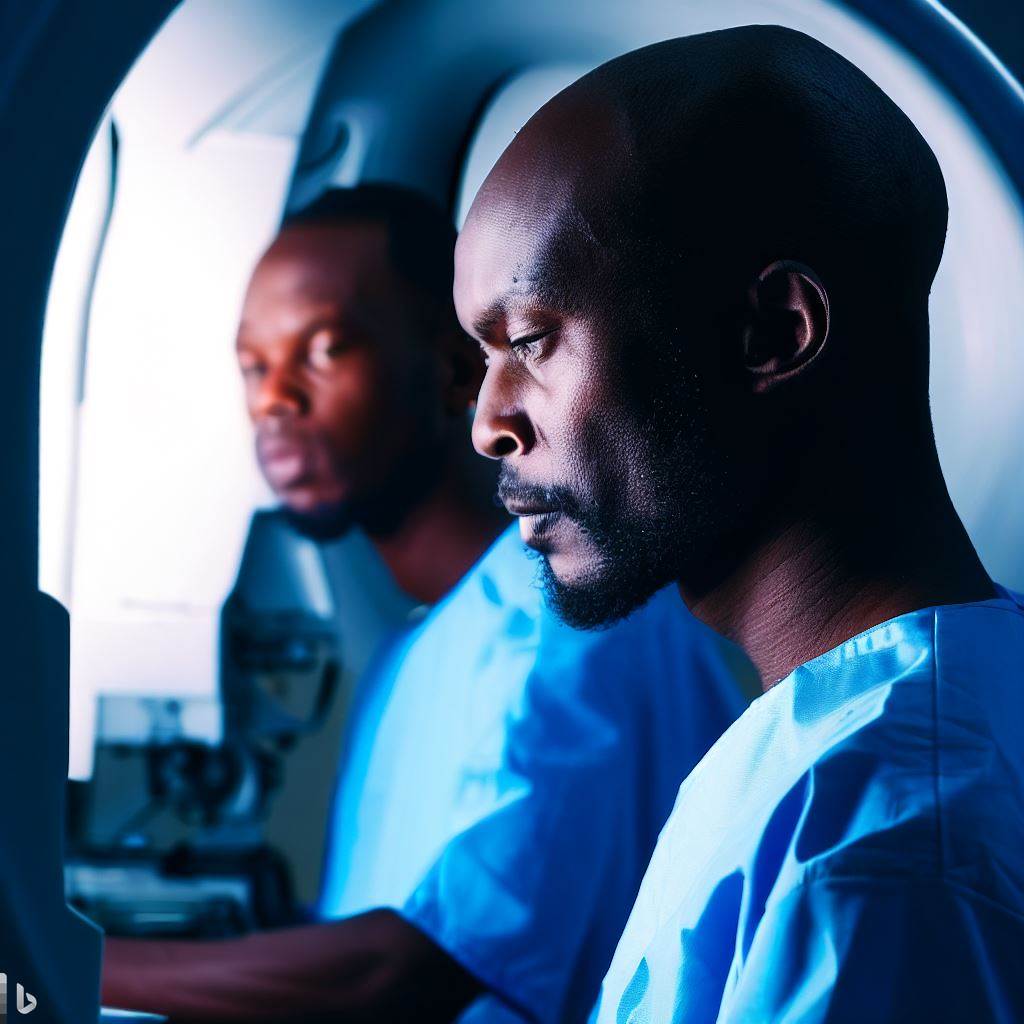Introduction
Speech-language pathology is a specialized field that centers on diagnosing and treating communication and swallowing disorders.
Its significance in Nigeria cannot be overstated, as it holds the potential to significantly enhance the quality of life for many individuals facing such challenges.
In Nigerian universities, Speech-Language Pathology programs play a crucial role in equipping students with the knowledge and skills needed to address these disorders effectively.
By training future professionals in this field, the universities contribute to building a competent workforce that can make a positive impact on the lives of those with communication and swallowing difficulties.
Through research, education, and clinical practice, Speech-Language Pathology in Nigerian universities strives to not only enhance the understanding of these disorders but also develop innovative therapies and interventions.
These advancements ensure that individuals with communication and swallowing disorders receive better care and support.
Overall, the presence of Speech-Language Pathology in Nigerian universities signifies a commitment to fostering a society where communication difficulties are addressed with empathy and expertise.
By continuously improving and expanding this field, Nigeria can make significant strides in enhancing the well-being and inclusivity of its population facing such challenges.
Overview of Nigerian universities offering speech-language pathology programs
Some notable universities in Nigeria
- University of Lagos
- University of Ibadan
- Ahmadu Bello University
- Obafemi Awolowo University
- University of Nigeria, Nsukka
Availability of speech-language pathology programs in these universities
Nigeria, as one of Africa’s most populous countries, faces an increasing demand for speech-language pathology professionals, specialized in diagnosing and treating speech and language disorders.
To address this need, several prominent Nigerian universities now offer comprehensive speech-language pathology programs.
The University of Lagos, known for its academic excellence, provides students with extensive training in speech disorders, language development, and communication disorders.
This equips students with the necessary knowledge and skills to assess and treat individuals with communication difficulties.
Similarly, the University of Ibadan, renowned for its academic history, offers a well-rounded education in communication sciences and disorders.
Their curriculum includes theoretical and practical courses, clinical practicums, and research opportunities, preparing students for successful careers in the field.
Ahmadu Bello University is also recognized for its commitment to producing highly skilled professionals in speech-language pathology.
Their program emphasizes speech disorders, language acquisition, and communication development, providing practical experiences through clinical rotations.
Obafemi Awolowo University is another prestigious institution with a strong emphasis on understanding and managing speech and language disorders.
Students gain hands-on experiences in clinical settings, enabling them to positively impact individuals with speech difficulties.
The University of Nigeria, Nsukka, is also dedicated to providing quality speech-language pathology education.
Their program enhances students’ knowledge of communication disorders and their ability to evaluate and treat clients effectively.
These Nigerian universities offering speech-language pathology programs play a crucial role in producing qualified professionals who can meet the communication needs of individuals in the country.
With a growing demand for speech-language pathology services, these institutions continue to equip students with the necessary knowledge and skills to make a significant difference in the lives of individuals with speech and language difficulties.
Admission requirements for speech-language pathology programs
Academic qualifications needed
To pursue a career in speech-language pathology in Nigerian universities, certain academic qualifications are required.
These qualifications serve as a foundation for students to build their knowledge and skills in this field.
- Bachelor’s degree: Students need to have completed a bachelor’s degree in a related field such as linguistics, psychology, or communication sciences and disorders.
- Minimum GPA: Most universities require a minimum grade point average (GPA) for admission into their speech-language pathology programs. This ensures that students have a strong academic foundation.
- Prerequisite courses: Students may be required to have taken specific prerequisite courses, such as anatomy, physiology, phonetics, and psychology.
These courses provide a basic understanding of the human body and communication processes.
Entrance exams or interviews
In addition to academic qualifications, speech-language pathology programs may also require students to go through entrance exams or interviews.
These additional assessments help universities gauge a student’s potential and readiness for the program.
- Entrance exams: Some universities may require students to take entrance exams, such as the Unified Tertiary Matriculation Examination (UTME) or the university’s internal entrance exam.
These exams test the student’s knowledge and aptitude in relevant subjects. - Interviews: Interviews may be conducted to determine a student’s communication skills, interpersonal abilities, and passion for the field.
It also gives the program coordinators an opportunity to assess the student’s fit for the program.
Specific requirements related to the field
Apart from academic qualifications and entrance exams, there may be specific requirements related to the field of speech-language pathology that students need to fulfill.
- Experience or volunteer work: Some universities may require students to have relevant experience or volunteer work in the field.
This demonstrates their commitment and practical understanding of speech-language pathology. - Letters of recommendation: Students may be asked to submit letters of recommendation from professors, employers, or professionals in the field.
These letters vouch for the student’s character, work ethic, and potential as a speech-language pathology professional. - Personal statement or essay: Universities may ask students to write a personal statement or essay explaining their interest in speech-language pathology and their career goals.
This allows the program coordinators to understand the student’s motivation and aspirations. - Additional certifications: Depending on the university and program, students may need to obtain additional certifications, such as first aid or cardiopulmonary resuscitation (CPR) certification.
These certifications enhance the student’s preparedness for real-world scenarios.
In fact, aspiring speech-language pathology students in Nigerian universities must fulfill certain admission requirements.
Academic qualifications, entrance exams or interviews, and specific field-related requirements play vital roles in the selection process.
Meeting these requirements ensures that students are adequately prepared for the rigorous journey ahead in the field of speech-language pathology.
Course Curriculum and Structure in Nigerian Universities
Speech-Language Pathology programs in Nigerian universities offer a comprehensive curriculum to prepare students for a rewarding career in the field.
The courses are structured to provide a well-rounded education, covering essential topics related to communication disorders.
Overview of core courses offered in speech-language pathology programs
The core courses lay the foundation for students’ understanding of speech-language pathology.
They cover fundamental areas such as communication disorders, speech and hearing anatomy and physiology, language development, phonetics and phonology, speech disorders, language disorders, voice and resonance disorders, augmentative and alternative communication, and swallowing disorders.
These courses ensure that students gain a strong knowledge base in the field.
Electives or specialization options, if any
Nigerian universities offer students the opportunity to specialize in particular areas of speech-language pathology through elective courses.
These specializations include Neurogenic Communication Disorders, Pediatric Speech-Language Pathology, Adult Speech-Language Pathology, Research Methods in Speech-Language Pathology, and Counseling Techniques for Speech-Language Pathologists.
This allows students to tailor their education to match their interests and career aspirations.
Practical training or internship requirements
Practical training is a vital component of speech-language pathology programs in Nigerian universities.
Students undergo clinical observation, where they learn from experienced speech-language pathologists in clinical settings.
They also engage in supervised clinical practicum, where they work directly with clients under the guidance of licensed professionals.
Additionally, students are required to complete internships in speech-language pathology clinics or hospitals to gain real-world experience.
These practical experiences prepare students for their future careers and provide exposure to diverse cases.
Community Outreach Programs
Nigerian universities place a strong emphasis on community outreach programs.
These initiatives enable students to offer speech and language services to underserved populations, contributing to the well-being of diverse communities.
Additionally, these programs help raise awareness about communication disorders and their impact.
In summary, Speech-Language Pathology programs in Nigerian universities provide a comprehensive education that includes core courses, elective specializations, and practical training.
Graduates emerge well-prepared to address the communication needs of individuals across different age groups and backgrounds.
The combination of theoretical knowledge and hands-on experience equips students with the skills necessary to excel in their future careers as speech-language pathologists.
Read: Becoming a Speech-Language Pathologist: Nigerian Edition

Faculty and resources available in Nigerian universities
In Nigerian universities, the faculty and resources available for Speech-Language Pathology are crucial for providing high-quality education.
Qualified faculty members
The universities in Nigeria have a dedicated team of qualified faculty members in the field of Speech-Language Pathology.
These faculty members possess extensive knowledge and experience in the subject matter.
They have the necessary qualifications and certifications to teach and guide students in the field.
The faculty members are passionate about their work and are committed to providing the best education to their students.
They use innovative teaching methods to engage students and enhance their learning experience.
The faculty members also serve as mentors and advisors to the students, helping them make informed decisions about their career paths.
Research opportunities in the field
Nigerian universities offer ample research opportunities for students in the field of Speech-Language Pathology.
These research opportunities allow students to explore and discover new insights in the field.
Students have the chance to work on research projects under the guidance of experienced faculty members.
Participating in research helps students develop critical thinking and problem-solving skills.
It also enables them to contribute to the existing body of knowledge in Speech-Language Pathology.
Research opportunities in Nigerian universities expose students to current trends and advancements in the field.
Speech-language pathology labs and equipment
Nigerian universities have well-equipped speech-language pathology labs to facilitate practical learning.
These labs are equipped with state-of-the-art equipment and tools necessary for conducting various diagnostic and therapeutic procedures.
Students have access to a wide range of assessment tools to evaluate communication disorders in individuals of different age groups.
The labs provide hands-on training, allowing students to practice and hone their clinical skills.
Students learn how to administer and interpret assessments, develop treatment plans, and implement therapeutic techniques.
The availability of speech-language pathology labs ensures that students are well-prepared for real-world clinical practice.
In conclusion, Nigerian universities offer a conducive environment for studying Speech-Language Pathology with their qualified faculty, research opportunities, and well-equipped labs.
These resources play a significant role in shaping competent speech-language pathologists who can make a positive impact in society.
Read: Impact of Speech-Language Pathology in Nigeria’s Healthcare
Challenges and Limitations Faced by Speech-Language Pathology Programs in Nigeria
Limited number of universities offering the program
There is a scarcity of Nigerian universities that offer speech-language pathology programs.
These limited options make it challenging for individuals interested in pursuing this field of study.
The lack of availability hinders the growth and development of speech-language pathology in the country.
Prospective students often have to relocate or study abroad to access these specialized programs.
Increasing the number of universities offering this program can help meet the demand and expand the profession.
Shortage of qualified faculty members
Nigeria faces a shortage of highly trained and experienced faculty members in speech-language pathology.
This scarcity leads to a lack of expert guidance and mentorship for aspiring speech-language pathologists.
The limited number of faculty members also creates a high staff-to-student ratio, impacting the quality of education.
Efforts should be made to attract and retain qualified professionals in academia to address this shortage.
Insufficient resources and funding for practical training
Speech-language pathology programs in Nigeria often struggle with inadequate resources and funding.
Practical training is an essential component of these programs, but lack of resources hampers hands-on learning opportunities.
There is a need for specialized equipment, assessment tools, and therapy materials to enhance practical training.
Inadequate funding limits the ability to procure these resources and maintain up-to-date facilities.
Seeking external partnerships, grants, and increased government support can alleviate these resource constraints.
Enhancing funding and resource allocation can improve the overall quality of speech-language pathology education in Nigeria.
Investments in research and technological advancements will also facilitate innovative approaches in assessment and therapy.
In the end, speech-language pathology programs in Nigeria face several significant challenges and limitations.
The limited number of universities offering the program restricts accessibility and hinders the profession’s growth.
Additionally, the shortage of qualified faculty members affects the quality of education and mentorship provided to students.
Insufficient resources and funding hinder practical training, impacting hands-on learning opportunities.
To overcome these challenges, it is crucial to increase the number of universities offering the program, attract and retain qualified faculty members, and secure adequate funding and resources for practical training.
These measures will enhance the development and accessibility of speech-language pathology programs in Nigeria, ultimately benefiting individuals in need of speech and language therapy services.
Read: Salary and Benefits of MRI Technologists in Nigeria
Success stories and achievements of Nigerian speech-language pathologists
Notable individuals who have excelled in the field
In the field of speech-language pathology, Nigeria has witnessed the emergence of highly successful individuals who have made significant contributions to the profession and society at large.
Let’s take a closer look at their achievements and the influence they have had.
- Dr. Ayodele Oluwaranti is a renowned speech-language pathologist who has pioneered remarkable research in the field.
Her work on communication disorders in children has helped improve early intervention strategies. - Professor Oluremi Sonaiya has been instrumental in the development of speech-language pathology programs in Nigerian universities.
Her dedication and efforts have resulted in the establishment of modern facilities and enhanced educational opportunities for aspiring professionals. - Dr. Chinyere Ohiri-Aniche has spearheaded numerous community outreach programs to raise awareness about speech and language disorders.
Her initiatives have not only provided support to affected individuals but have also reduced the stigma associated with these conditions. - Professor Babajide Akanbi has made significant contributions in the area of adult neurogenic communication disorders.
His research and clinical expertise have led to improved rehabilitation techniques for individuals who have suffered from strokes and traumatic brain injuries. - Dr. Emmanuella Abam is a speech-language pathologist who has focused on language and literacy development in children with autism spectrum disorder.
Her interventions and strategies have helped numerous children improve their communication and academic skills. - Professor Ifeoma Nwaogazie has been pivotal in promoting the importance of cultural competence in speech-language pathology.
Her work has emphasized the need for practitioners to consider cultural factors when assessing and treating individuals from diverse backgrounds. - Dr. Victor Ilenre has dedicated his career to the field of voice disorders.
His research and clinical expertise have helped in the diagnosis and management of various voice conditions, thereby improving the quality of life for affected individuals.
Impact on the profession and the society
The impact of these speech-language pathologists extends beyond their individual achievements.
Their work has influenced the profession as a whole, leading to advancements in research, education, and clinical practice.
Through their dedication and expertise, they have raised the standard of care for individuals with speech and language disorders in Nigeria.
These professionals have also had a significant impact on society. By raising awareness, conducting research, and providing interventions, they have helped improve the lives of countless individuals and their families.
Their efforts have not only led to improved communication skills but have also empowered individuals to fully participate in social, educational, and professional activities.
Furthermore, the success stories of these Nigerian speech-language pathologists serve as an inspiration for aspiring professionals.
Their accomplishments demonstrate that with dedication, hard work, and a passion for helping others, individuals can make a significant difference in the field.
Their achievements encourage others to pursue careers in speech-language pathology, thereby contributing to the growth and development of the profession in Nigeria.
Therefore, Nigerian speech-language pathologists have achieved remarkable success in their field.
Through their research, clinical expertise, and community initiatives, they have made lasting impacts on the profession and society.
Their dedication and commitment to improving the lives of individuals with communication disorders serve as a source of inspiration for future generations of speech-language pathologists in Nigeria.
Read: Comparative Study: Speech-Language Pathology in Nigeria vs the World
Opportunities and future prospects in speech-language pathology in Nigeria
Growing Demand for Speech-Language Pathologists in Various Sectors
The field of Speech-Language Pathology in Nigeria is witnessing a rising demand for professionals with expertise in communication disorders.
Hospitals and healthcare centers are actively seeking qualified speech-language pathologists to diagnose and treat individuals with communication difficulties.
By helping patients regain their ability to communicate effectively, these professionals contribute significantly to improving their quality of life.
Educational institutions are also recognizing the importance of speech-language pathologists in supporting children with speech and language difficulties.
Early intervention by these experts enables children to acquire essential communication skills, facilitating their academic success.
Potential Career Paths and Specialization
Speech-Language Pathologists in Nigeria have diverse career paths to explore across various sectors.
They can find opportunities in hospitals, clinics, rehabilitation centers, schools, research institutes, and private practice.
The flexibility allows professionals to align their career with their interests and skills.
Furthermore, specialization within the field is possible, allowing professionals to focus on areas such as pediatric speech therapy, adult speech therapy, voice disorders, swallowing disorders, and more.
This specialization enhances their expertise and makes them invaluable assets in their chosen field.
Nigerian universities play a crucial role in nurturing future speech-language pathologists.
These institutions offer comprehensive education and training programs to equip students with the necessary knowledge and practical skills.
As the demand for speech-language pathologists increases in the country, these universities play a pivotal role in producing well-prepared professionals to meet the healthcare and education sectors’ needs.
Importance of Continuous Professional Development
Continuous professional development is of paramount importance for speech-language pathologists in Nigeria to stay at the forefront of their field.
Engaging in conferences, workshops, and training programs helps professionals deepen their understanding and learn about the latest therapeutic methods.
Furthermore, networking with other professionals and participating in research projects contribute to ongoing professional growth.
By embracing continuous learning, speech-language pathologists can make significant contributions to Nigeria’s healthcare and education systems.
Speech-Language Pathology in Nigeria offers a wealth of opportunities and promising future prospects. The growing demand for professionals in this field signifies a rewarding career path for aspiring individuals.
With the ability to specialize, professionals can enhance their expertise and make a greater impact.
Nigerian universities play a crucial role in shaping the next generation of speech-language pathologists, ensuring the country has well-prepared professionals to meet the increasing demand.
Emphasizing continuous professional development will keep these experts updated and capable of making significant contributions to the healthcare and education sectors in Nigeria.
Conclusion
In Nigeria, speech-language pathology has significant importance in addressing communication and swallowing disorders.
These disorders can greatly impact an individual’s quality of life, making it necessary to have qualified professionals who can provide appropriate intervention and support.
Aspiring speech-language pathologists should not be discouraged by the challenges they may face.
Instead, they should be motivated by the opportunity to improve the lives of those affected by communication and swallowing disorders.
Pursuing a career in speech-language pathology requires dedication, perseverance, and a genuine passion for helping others.
In the Nigerian context, where limited resources and awareness exist, aspiring speech-language pathologists can play a pivotal role in promoting the importance of early intervention and providing much-needed services.
By understanding the unique challenges faced in Nigeria and adapting evidence-based practices to suit their context, these aspiring professionals can make a meaningful impact in a meaningful way.
It is crucial that aspiring speech-language pathologists seek educational opportunities that provide comprehensive training and practical experience.
Nigerian universities are working towards expanding their programs and improving their curriculum to produce well-rounded speech-language pathologists who are capable of addressing the diverse needs of the population.
Overall, speech-language pathology in Nigeria holds immense significance in improving the lives of individuals with communication and swallowing disorders.
Aspiring speech-language pathologists should follow their dreams, overcome obstacles, and contribute to the development of this field in Nigeria, ultimately making a positive impact on the lives of those in need.




